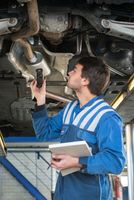What Are Exhaust Systems & How Do They Work?

When your car’s engine produces emissions, the exhaust system is responsible for diverting them away so that they don’t cause damage. Found running along the underside of the car, these systems are also designed to reduce engine noise and minimize the toxicity of the fumes that come from your vehicle. While exhaust systems can usually function without concern, it’s important for all drivers to know how they work and identify potential issues that require professional auto repairs. To help you gain a better understanding of your vehicle’s performance, here are a few key details to know about exhaust systems.
What Parts Are Found in an Exhaust System?
A complete exhaust system is comprised of five or six individual parts that all serve a specific function. The front of the system consists of the exhaust manifold—a part that vents fumes into a single pipe. Attached to the manifold is the oxygen sensor, a device that tells your car’s computer system the ideal oxygen-to-fuel ratio for combustion.
 From the manifold, fumes will travel through the exhaust pipes to the catalytic converter—a device that transforms harmful waste into water and carbon dioxide to help protect the environment. Since the process of combustion can be loud, a muffler is needed near the end of the exhaust pipes to help cancel out the sound waves.
From the manifold, fumes will travel through the exhaust pipes to the catalytic converter—a device that transforms harmful waste into water and carbon dioxide to help protect the environment. Since the process of combustion can be loud, a muffler is needed near the end of the exhaust pipes to help cancel out the sound waves.
What Are Common Exhaust System Problems?
1. Exhaust Leaks
If any part of your exhaust system is damaged due to rust or driving on rough roads, a leak can form and allow emissions to escape where they shouldn’t be able to. Depending on the nature of the leak, your engine performance and fuel-efficiency may drop. In other cases, the problem may produce bad burning smells, smoke, vibrations, or loud noises.
2. Faulty Oxygen Sensor
In many cases, the check engine light will come on if the car’s computer system detects a faulty oxygen sensor. While this part can be replaced fairly quickly by an auto repair specialist, leaving the issue unaddressed can impair fuel-efficiency and clog the catalytic converter.
3. Clogged Catalytic Converter
In general, catalytic converters are designed to last for a decade or longer. However, over time, debris and soot from emissions can build up and clog the catalytic converter. This problem may cause noticeable issues with acceleration and driving performance, and in some cases, produce a bad sulfur odor. Fortunately, auto repair shops can fix these problems by replacing the part.
Whether your car is producing loud noises or experiencing poor fuel-efficiency, Wright's 210 Auto Body & Muffler Shop can provide in-depth exhaust system repairs to get you back on the road with confidence. Serving the Hodgenville, KY, community for over six decades, this auto repair shop can pinpoint and address exhaust issues with accuracy and speed. Visit this auto mechanic online to learn more about these and other affordable services they offer—including collision repair, car battery replacement, and brake service. For appointments or estimates, call (270) 358-4256 to speak with a friendly specialist.
About the Business
Have a question? Ask the experts!
Send your question

